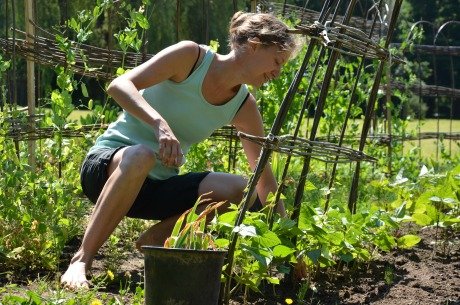
By Bronwyn Scott
Published: Sept 7, 2013
Sarah Laurenson was just seven years old when she dug up a small plot of land in her yard.
Her mother bought her seeds and gave her free reign over the soil.
It was hers: Sarah’s Garden.
And now, 24 years later, she still has a garden, even though she doesn’t have the land to grow it on.
Laurenson borrows land, and in exchange she gives the property owners fresh produce.
“I moved up to Squamish and I didn’t know anyone, I just knocked on peoples’ doors,” said Laurenson.
It’s a method that’s paid off and today she’s selling her freshly grown fruits and veggies at farmers’ markets and in Kitchen Quickies, the organic health food store she manages.
Stefan Butler of Good Time Farming is also in the business of farming on others’ property and selling the fruits of his labour locally.
They’re part of a motion to create a sustainable food system here in Squamish that has been catching on for some time now.
Food security and self-sufficiency are motivating principles that drive their practices.
“It’s more than a trend,” said Laurenson.
“People want to know where their food is from . . . they’re able to have control with that knowledge.” Sarah Laurenson.
The new community gardens in town seem to be a testament to the wave of enthusiasm for urban farming.
The second community garden had a waiting list, said Carolyn Morris, the manager of Squamish Community Garden.
A short season, however, presents a challenge.
“It’s very difficult to run a farming operation here,” said Butler.
Still, a small group of devoted earth-tillers are reinventing the classical farm with small scale, urban operations.
SPIN farming (Small Plot Intensive) is part of the scene and it’s taking hold in the minds of food conscious citizens, in Squamish but also around the world.
“It’s easy to inspire people to grow food when there is just so much awareness about it,” said Roxanne Christensen.
Christensen lives in Philadelphia and is one of the founders of the SPIN model, which helps farmers overcome typical obstacles like unaffordable land access and difficulty entering markets to sell crops.
She thinks there’s a direct link between pressing world problems and the enthusiasm about growing food.
Christensen remembers the day she started her own urban garden. It was Sept. 11, 2001 – better known as 9/11.
“It seems after that people were much more interested in local food . . . it just got people much more aware of wellbeing and security in general,” she said.
And then there is the joy of gardening, and the feeling of being connected to the earth.
“I love having my hands in the dirt…I just loved watching things grow,” said Sarah.



